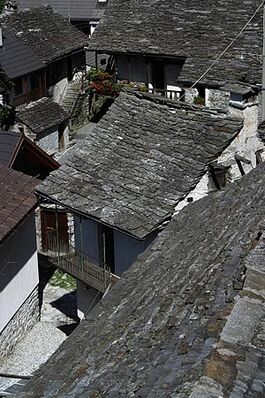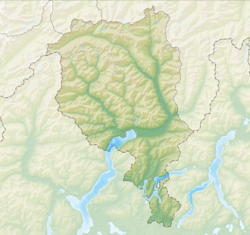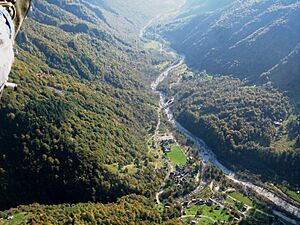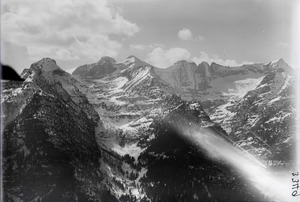Frasco facts for kids
Quick facts for kids
Frasco
|
||
|---|---|---|

Frasco village
|
||
|
||
| Country | Switzerland | |
| Canton | Ticino | |
| District | Locarno | |
| Area | ||
| • Total | 25.72 km2 (9.93 sq mi) | |
| Elevation | 885 m (2,904 ft) | |
| Population
(December 2019)
|
||
| • Total | 112 | |
| • Density | 4.355/km2 (11.28/sq mi) | |
| Postal code |
6636
|
|
| Surrounded by | Chironico, Gerra (Verzasca), Giornico, Lavertezzo, Personico, Sonogno | |
Frasco is a charming village located in the Ticino canton of Switzerland. It's part of the Locarno district. Until recently, Frasco was its own independent municipality, which is like a small local government area.
On October 17, 2020, Frasco joined forces with four other nearby villages. These were Vogorno, Sonogno, Corippo, and Brione (Verzasca). Together, they formed a brand new, larger municipality called Verzasca.
Contents
Frasco's History and Past
Frasco has a long history, first being mentioned way back in 1235. Back then, it was known as Felasco.
Early Communities and Changes
During the Middle Ages, Frasco was part of a bigger community. This community was called the Vicinanza of Verzasca. Think of it as a large neighborhood or group of villages working together.
In 1395, Frasco and the village of Sonogno became a single political municipality. This arrangement lasted for a long time, until 1843.
Village Church and Parish Life
The village church, dedicated to St. Bernhard, was likely built in the 14th century. The church you see today was built much later, between 1868 and 1869. It stands on the foundations of that older building.
In 1518, Frasco and Sonogno separated from the main parish of Vogorno. A parish is an area served by a local church. They formed their own parish, which then split again in 1734.
Old Ways of Life and New Industries
For many centuries, people in Frasco made a living from farming. They also practiced seasonal migrations with their livestock. This meant moving animals to different pastures depending on the season.
Around 1870, a new industry began in the Val d'Efra. This area had a vein of white marble, which was used for limestone quarries.
In 2000, farming was the main job source within Frasco itself. However, about two-thirds of the workers traveled outside the village for their jobs.
Historical Buildings and Art
In a small area called Piede della Motta, you can find frescoes from the 15th century. Frescoes are paintings done on wet plaster. Today, all the old parts of the village are protected as historical buildings. Even so, many new houses have been built in the area more recently.
Frasco's Geography and Landscape
As of 1997, Frasco covered an area of about 25.72 square kilometers (about 9.93 square miles). Let's break down how this land was used:
- Agricultural land: 1.7% was used for farming.
- Forests: 43.3% was covered by forests.
- Settled areas: 0.9% had buildings or roads.
- Rivers or lakes: 1.9% was covered by water.
- Unproductive land: 47.0% was land that couldn't be used for farming or building.
More Details on Land Use
Within the settled areas, 0.4% was for housing and buildings. Roads and other transport areas made up 0.3%.
Looking at the forested land, 27.4% was dense forest. Another 11.7% had small trees and bushes. About 4.1% was covered with orchards or small groups of trees.
For agricultural land, 1.3% was used for growing crops. All the water in the area was flowing water, like rivers.
Of the unproductive areas, 24.3% had vegetation that wasn't useful for farming. Another 22.7% was too rocky for any plants to grow.
Village Location and Elevation
The village of Frasco is located in the Locarno district. It includes the main village and several smaller settlements. These are spread out along the road in the upper Verzasca valley. The average height of these settlements above sea level is about 880 meters (2,887 feet).
Frasco's Coat of Arms
The blazon (official description) of Frasco's municipal coat of arms is: Azure a winged fish flying in bend sinister. This means it shows a blue background with a winged fish flying diagonally. The flying fish on the coat of arms represents the trout farming and fishing that are common in the area.
Frasco's Population and People
In 2019, Frasco had a population of 112 people. As of 2008, about 7.7% of the people living there were foreign nationals. Over ten years, from 1997 to 2007, the population grew by 18.8%.
Languages Spoken
Most people in Frasco speak Italian. In 2000, about 94.0% of the population spoke Italian. German and French were the next most common languages, with 1.0% speaking each.
Population Changes and Age Groups
In 2008, there was one birth and one death among Swiss citizens in Frasco. Also, one non-Swiss man and one non-Swiss woman moved to Switzerland and settled in Frasco. Overall, the population grew by 2.6% in 2008.
Looking at the age groups in 2009:
- Children (0-9 years old): 8.8% of the population (10 children).
- Teenagers (10-19 years old): 16.8% of the population (19 teenagers).
- Young adults (20-29 years old): 5.3% of the population (6 people).
- Adults (30-59 years old): 46.9% of the population (53 people).
- Seniors (60+ years old): 22.2% of the population (25 people).
Homes and Households
In 2000, there were 37 private households in Frasco. On average, there were 2.6 people living in each household. Most of the buildings were single-family homes (93.5%).
Many apartments in Frasco are used seasonally, meaning people live there only part of the year. In 2000, 82.7% of the apartments were for seasonal use, while 17.3% were lived in all year round.
Historical Population Numbers
Here's how Frasco's population has changed over the years:
| year | population |
|---|---|
| 1626 | 550 |
| 1850 | 445 |
| 1900 | 345 |
| 1950 | 128 |
| 1990 | 157 |
| 2000 | 100 |
Frasco's Economy and Jobs
In 2007, Frasco had a low unemployment rate of 1.32%. This means most people who wanted to work had jobs.
Types of Jobs
As of 2005, 10 people worked in the primary economic sector. This sector includes jobs like farming, fishing, and forestry. There were about 4 businesses in this sector.
No one was employed in the secondary sector (manufacturing) or the tertiary sector (services).
In total, 37 residents of Frasco were employed. About 27.0% of these workers were female.
Commuting to Work
In 2000, 24 workers from Frasco traveled outside the municipality for their jobs. Most people used a private car to get to work (62.2%). Only 2.7% used public transportation.
Religion in Frasco
According to the 2000 census, most people in Frasco were Roman Catholic, making up 87.0% of the population. A small number, 2.0%, belonged to the Swiss Reformed Church. About 7.0% belonged to other churches, and 4.0% did not answer the question about their religion.
Education in Frasco
Switzerland generally has a well-educated population. In Frasco, about 63.1% of adults (aged 25 to 64) had completed either advanced high school education or higher education, like university.
Schooling System
In 2009, there were 22 students in Frasco. The Ticino education system offers up to three years of non-mandatory kindergarten. In Frasco, 2 children were in kindergarten.
The primary school program lasts for five years. In Frasco, 7 students attended these standard primary schools.
For middle school, students either go to a two-year middle school followed by a two-year pre-apprenticeship program, or they attend a four-year program to prepare for higher education. In Frasco, 9 students were in the two-year middle school, and 1 student was in the four-year advanced program.
Vocational Training
After middle school, students can choose different paths for upper secondary education. This prepares them for a trade or for university. In Ticino, students can attend vocational school while doing an internship or apprenticeship. This usually takes three or four years. Alternatively, they can attend school full-time for one year, followed by an internship. In Frasco, 1 student was attending vocational school full-time, and 2 were attending part-time.
In 2000, 4 students from Frasco attended schools outside the municipality.
See also
 In Spanish: Frasco (Tesino) para niños
In Spanish: Frasco (Tesino) para niños
 | John T. Biggers |
 | Thomas Blackshear |
 | Mark Bradford |
 | Beverly Buchanan |






